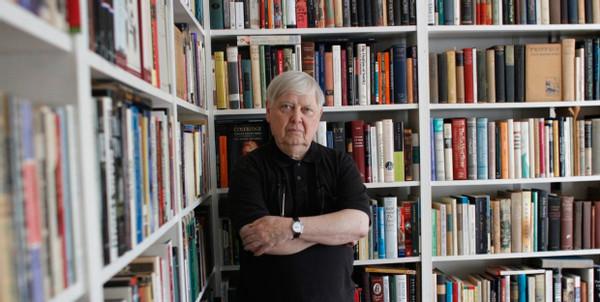William H. Gass’s Advice for Writers
Curated from: lithub.com
Ideas, facts & insights covering these topics:
12 ideas
·1.21K reads
11
Explore the World's Best Ideas
Join today and uncover 100+ curated journeys from 50+ topics. Unlock access to our mobile app with extensive features.
A Writer Interested In How One Writes Anything
William H. Gass was a boundary-breaking experimental writer, as well as a critic, essayist and philosophy professor. Most importantly, Gass was a reigning master of the art of the sentence, and every one he wrote, he wrote with singular purpose. “If I am anything as a writer, that is what I am: a stylist,” he said in an interview. “I am not a writer of short stories or novels or essays or whatever. I am a writer, in general. I am interested in how one writes anything.”
13
205 reads
“Put All Those Nasty Thoughts You Have To Use”
”If someone asks me, ‘Why do you write?’ I can reply by pointing out that it is a very dumb question. Nevertheless, there is an answer. I write because I hate. A lot. Hard. And if someone asks me the inevitable next dumb question, ‘Why do you write the way you do?’ I must answer that I wish to make my hatred acceptable because my hatred is much of me, if not the best part. Writing is a way of making the writer acceptable to the world—every cheap, dumb, nasty thought, every despicable desire, every noble sentiment, every expensive taste.”
15
150 reads
“Be Stubborn, Even In The Face Of Rejection”
“I was turned down for ten years. I couldn’t get a thing in print. My writing went nowhere. I guess you have to be persistent. Talent is just one element of the writing business. You also have to have a stubborn nature. That’s rarer even than the talent, I think. You have to be grimly determined. I certainly was disappointed; I got upset. But you have to go back to the desk again, to the mailbox once more, and await your next refusal.”
12
133 reads
“Get Even (Get Justice)”
“Getting even is one great reason for writing. The precise statement of the motive is tricky, but the clearest expression of my unwholesome nature and my mean motives appears in a line I like in [one of my books]: the character says, “I want to rise so high that when I shit I won’t miss anybody.” […] I also take considerable pleasure in giving obnoxious ideas the best expression I can. But getting even isn’t necessarily vicious. There are two ways of getting even: one is destructive and the other is restorative. It depends on how the scales are weighted. Justice, I think, is the word I want.”
12
106 reads
“See Around Your Subject”
“Even an ideologically driven artist who is working well has got to do that. Oh, he can create a character who speaks brilliantly from a half-baked point of view, but he cannot create a drama of conflict between points of view unless he can imaginatively put himself in two positions… Any work of art is going to be dangerous to a point of view. If you are an artist, you have to see not only why you can’t walk on air, but also why people who think you can, think so. Art objects are inhospitable to secure truths. People who are fearful of protecting their own truth can’t have them around.”
13
90 reads
“Revise, Revise, Revise”
“I write slowly because I write badly. I have to rewrite everything many, many times just to achieve mediocrity. Time can give you a good critical perspective, and I often have to go slow so that I can look back on what sort of botch of things I made three months ago. Much of the stuff which I will finally publish, with all its flaws, as if it had been dashed off with a felt pen, will have begun eight or more years earlier, and worried and slowly chewed on and left for dead many times in the interim.”
13
78 reads
“Don’t Write For Anybody”
“I don’t think much about the reader. Ways of reading are adversaries—those theoretical ways. As far as writing something is concerned, the reader really doesn’t exist. The writer’s business is somehow to create in the work something which will stand on its own and make its own demands; and if the writer is good, he discovers what those demands are, and he meets them, and creates this thing which readers can then do what they like with. Gertrude Stein said, ‘I write for myself and strangers,’ and then eventually she said that she wrote only for herself.”
12
73 reads
“Don’t Write To Teach”
“I don’t believe in the novel that teaches. When you’re teaching, you’re engaged with something other than yourself. When you’re writing novels, you’re bringing things mainly out of yourself. You may be trying to make something that’s not autobiographical or self-reflective, but it’s made out of your character like a cake from flour. The consciousness it constructs may not be your everyday consciousness; nevertheless, it comes from your depths and not someone else’s. Whereas when you’re teaching you’re engaged with texts; it’s a different kind of thing.
12
60 reads
“Don’t Despair”
“Try to remember that artists in these catastrophic times, along with the serious scientists, are the only salvation for us, if there is to be any. Be happy because no one is seeing what you do, no one is listening to you, no one really cares what may be achieved, but sometimes accidents happen and beauty is born.”
13
75 reads
Works of art are meant to be lived with and loved, and if we try to understand them, we should try to understand them as we try to understand anyone—in order to know them better, not in order to know something else.
WILLIAM H. GASS
12
77 reads
...yes, words were superior; they maintained a superior control; they touched without your touching; they were at once the bait, the hook, the line, the pole, and the water in between.
WILLIAM H. GASS
12
82 reads
15
86 reads
IDEAS CURATED BY
CURATOR'S NOTE
Thoughts on creativity, creators and their creations, three things that we have come to consider consubstantial, coincident and coexistent, but that are fundamentally separate and disparate.
“
Xarikleia 's ideas are part of this journey:
Learn more about writing with this collection
The spiritual benefits of fasting
The rituals and practices during Ramadan
The importance of community and charity during Ramadan
Related collections
Similar ideas
20 ideas
Timeless Advice on Writing: The Collected Wisdom of Great Writers
themarginalian.org
5 ideas
What's The Best Way For SEO, Topic Experts & Writers To Work Together?
searchenginejournal.com
12 ideas
Read & Learn
20x Faster
without
deepstash
with
deepstash
with
deepstash
Personalized microlearning
—
100+ Learning Journeys
—
Access to 200,000+ ideas
—
Access to the mobile app
—
Unlimited idea saving
—
—
Unlimited history
—
—
Unlimited listening to ideas
—
—
Downloading & offline access
—
—
Supercharge your mind with one idea per day
Enter your email and spend 1 minute every day to learn something new.
I agree to receive email updates



